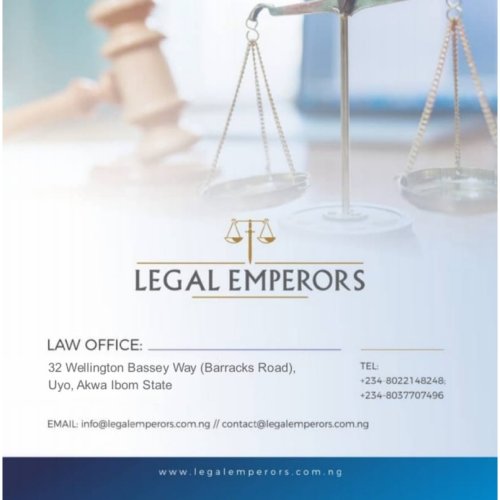Best Securities Lawyers in Uyo
Share your needs with us, get contacted by law firms.
Free. Takes 2 min.
List of the best lawyers in Uyo, Nigeria
About Securities Law in Uyo, Nigeria
Securities law in Uyo, Nigeria, is a complex field that involves the regulation of financial instruments such as stocks, bonds, and mutual funds. This field is overseen by the Securities and Exchange Commission of Nigeria (SEC), which ensures the orderly conduct of financial markets, protects investors, and enhances the efficiency and transparency of the financial system. While Uyo is not traditionally a financial hub like Lagos or Abuja, there is a growing interest in investment and securities, driven by economic development in the region.
Why You May Need a Lawyer
Engaging a lawyer experienced in securities law is prudent in many situations. These include receiving allegations of regulatory non-compliance, dealing with cases of investment fraud, engaging in corporate restructuring that involves securities, and conducting due diligence for mergers and acquisitions. If you're involved in investing, whether as an individual or through a business, legal guidance can help you navigate complex regulations and protect your financial interests.
Local Laws Overview
The key aspects of local laws relevant to securities in Uyo involve the Investment and Securities Act (ISA), which governs securities transactions in Nigeria. These laws require companies to register their securities before issuance and comply with disclosure requirements to maintain transparency. The Capital Market (Securities) Rules and Regulations set by the SEC also play a vital role in overseeing activities, preventing market abuses, and ensuring that investments are safe and fair. The ISA also outlines the legal framework for resolving disputes and prosecuting offenses related to securities fraud.
Frequently Asked Questions
What are securities?
Securities are financial instruments that represent ownership in a publicly-traded corporation (stocks), a creditor relationship with a governmental body or a corporation (bonds), or rights to ownership as represented by an option.
Why is local knowledge important in securities law?
Local knowledge is essential because each region may have specific legal requirements and business customs that impact how securities law is applied and enforced.
What should I do if I suspect securities fraud?
If you suspect securities fraud, you should report it to the Securities and Exchange Commission and consult a lawyer immediately to understand your rights and potential recourse.
How does the SEC regulate securities in Uyo?
The SEC regulates securities by enforcing compliance with laws, promoting transparency among issuers, and verifying that transactions meet legal standards. They also investigate complaints and take enforcement actions when necessary.
Can foreign investors participate in the Uyo securities market?
Yes, foreign investors can participate in the Nigerian securities market, but they must comply with local laws and regulations, which might include registration and reporting requirements.
What is the role of a broker in securities trading?
A broker acts as an intermediary between buyers and sellers of securities, facilitating transactions while providing insights and advice based on market conditions and investor goals.
Do I need to register my company if I issue securities?
Yes, if your company plans to issue securities to the public, you must register with the SEC and adhere to the required legal frameworks to comply with transparency and protection standards.
How can I ensure compliance with securities laws?
Engaging a knowledgeable securities lawyer is crucial to ensure compliance, as they can assist in navigating complex regulations and keeping abreast of any legislative changes.
Are all types of securities regulated equally?
Different types of securities may be subject to different regulatory requirements. Stocks, bonds, and derivatives each have specific rules governing their issuance and trading.
Can digital currencies be considered securities?
The classification of digital currencies as securities can depend on their specific characteristics and how they are used, as determined by regulatory bodies like the SEC.
Additional Resources
For additional resources and support, you can contact the Nigerian Securities and Exchange Commission, Uyo Chamber of Commerce, or seek professional advice from reputable law firms specializing in securities. It's also beneficial to keep updated with publications and workshops from the SEC to understand evolving regulations and best practices.
Next Steps
If you find yourself in need of legal assistance in securities, start by gathering any relevant documents relating to your case. Contact a qualified lawyer specializing in securities law to discuss your situation and potential strategies. It's essential to address any concerns promptly, ensuring your rights and interests are protected in an increasingly complex financial environment.
Lawzana helps you find the best lawyers and law firms in Uyo through a curated and pre-screened list of qualified legal professionals. Our platform offers rankings and detailed profiles of attorneys and law firms, allowing you to compare based on practice areas, including Securities, experience, and client feedback.
Each profile includes a description of the firm's areas of practice, client reviews, team members and partners, year of establishment, spoken languages, office locations, contact information, social media presence, and any published articles or resources. Most firms on our platform speak English and are experienced in both local and international legal matters.
Get a quote from top-rated law firms in Uyo, Nigeria — quickly, securely, and without unnecessary hassle.
Disclaimer:
The information provided on this page is for general informational purposes only and does not constitute legal advice. While we strive to ensure the accuracy and relevance of the content, legal information may change over time, and interpretations of the law can vary. You should always consult with a qualified legal professional for advice specific to your situation.
We disclaim all liability for actions taken or not taken based on the content of this page. If you believe any information is incorrect or outdated, please contact us, and we will review and update it where appropriate.








